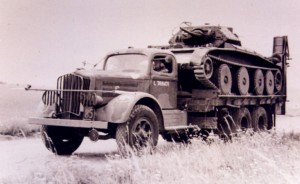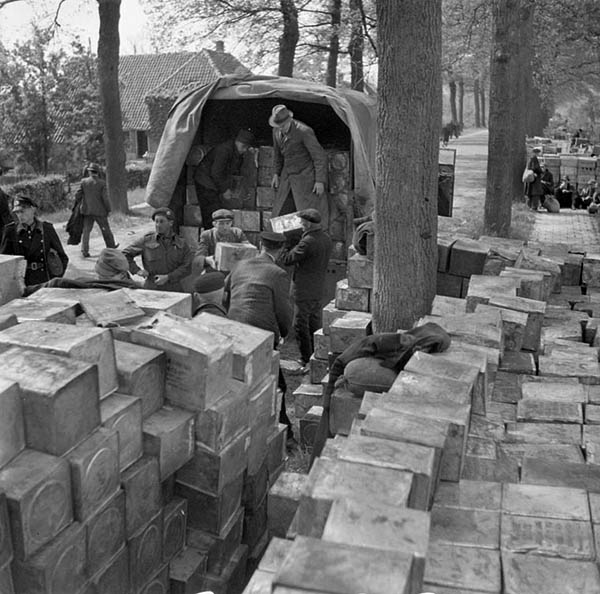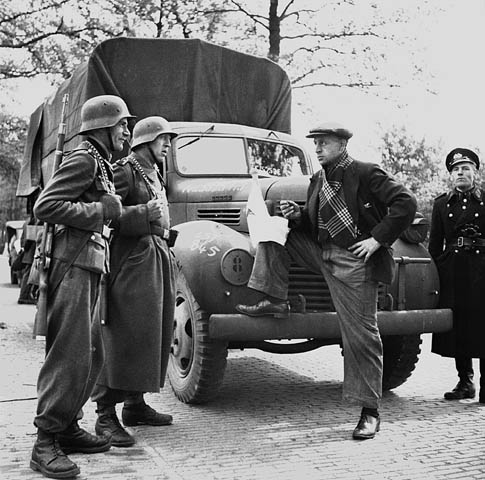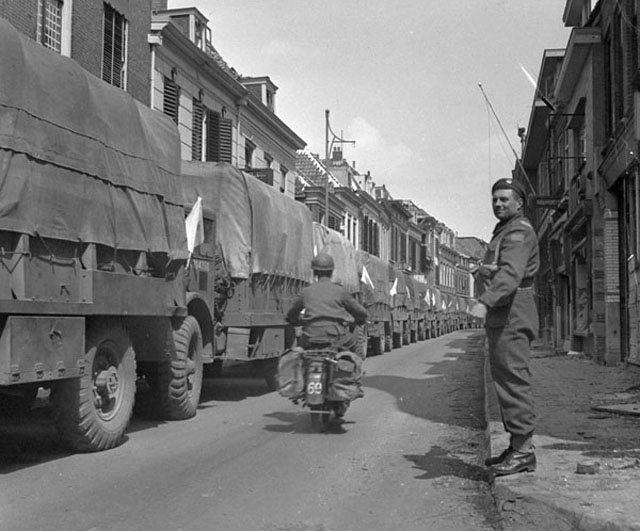This story is for Nova-Dawn (my daughter) and her children. I tell it so they know a little of one they never met and because that one, my dad, their grandfather and great grandfather, deserves to be known.
~~~~~~~~~~~~~~~~~~~~~~~~~
Dad died in the spring of 1965. He was 46 years old. The one thing I can honestly say is that I never really knew him while he lived; I wish I had. I think I would have liked him. I know very little of Dad prior to World War II. He was born in January of 1919; ninety two years ago.
My grandfather, Lewis Ealing, came to Canada from England in the summer of 1909. His parents names were Henry and Agnes. Grandfather named his first child (my dad) after his father and his second child after his mother. There were three more siblings to come; Evelyn, Winnifred and William. I'm not sure why but many boys with the given name Henry end up being called Harry, and that was the case with my dad. The only name I ever heard people call my dad was Harry.
From my aunts and uncle (who became uncle Bill, never William) I've learned that while growing up Dad was an extremely kind and unselfish person. He never swore, didn't drink, didn't smoke, went to church every Sunday and if someone was in need he would be the first one there. I've already mentioned previously that during the 1930s when money was scarce for everyone, he would take a swede saw and an axe and ride his bike up and down back lanes in Winnipeg looking for a cord of wood that needed sawing and splitting. He would saw, split and pile the whole cord for fifty cents. Having used a swede saw to cut, split and pile many cords of wood I can tell you that's a lot of hard work and would likely take at least four or five hours. That meant that he worked for ten cents an hour. Dad would then take the money and give at least half to his mother. If there was anyone that the saying "he'd give the shirt off his back" applied to it was my dad. He was considered by all to be a very gentle man. But this wasn't the man I knew.
I was born during World War II and was three years old when Dad arrived home from Europe. When Dad arrived home from the war my life changed completely. My mother was the only care giver I had known for three brief years. She had provided both my sister May and I a loving and nurturing home and then one day Dad walked in. To me Dad was just a terrifying stranger who appeared one day and started dominating our home. When it came to Dad, the man who went to war was not the same man who returned. My first memory of Dad is of him walking in our house carrying what looked like a big wooden box on his shoulder. This box turned out to be an elaborately carved chest he'd brought back from Europe. I can't remember ever knowing where or how he got it.
The man who never swore, drank or smoked before the war returned with all of these habits firmly intact, though I must say he wasn't a heavy drinker and I can't remember ever seeing him drunk. And the gentle man was left along a road in Europe somewhere. Somehow, amongst all his experiences a hardening and a coldness had filled the vacancy created when the gentle man left. War does that to a lot of good men. From a calm man he was now an angry man. And if there was one person he picked to release his rage it was me.
I hadn't thought about it much while he was alive but afterwards I used to wonder what it was that made him so angry. I knew that he had mainly driven trucks during the war. I'm sure he hauled other things but most of the pictures he brought back where him hauling tanks similar to the ones in these pictures.



Another time he rode a motorcycle leading a food convoy into Holland. A picture of him and his motorcycle appeared in the Winnipeg Free Press at the time. The following pictures document this event.

Dutch civilians load a Canadian truck with food, following agreement amongst Germans, Dutch and Canadians about the distribution of food to the Dutch population. 3 May 1945, near Wageningen, Netherlands.
(Photographer: Alex Stirton; Library and Archives Canada a134417)

German soldiers guard a food dump established in forward area, talking to one of the Dutch drivers who is to distribute the food in a Canadian truck. 3 May 1945, near Wageningen, Netherlands.
(Photographer: Alex Stirton; Library and Archives Canada a134416)

A convoy of trucks of Allied food supplies moving into German-occupied territory along the road from Wageningen to Rhenan, Netherlands, 3 May 1945.
(Photographer: Alex Stirton; Library and Archives Canada a134419)
Dad may even have been at the front of the above convoy. The white flags on the trucks and motor cycle signify that a truce was in effect while the food was brought into the Netherlands.
Dad was arguably the best truck driver I ever saw. He became a Sargent because of his ability to take charge of any situation and his knack of out performing others. I heard him recount the event that lead to his becoming a Sargent. Apparently it was winter and a driver had headed up to the front to pick up a tank that had been damaged. The trip was to take about three or four hours both ways. Just as this driver started back his truck slipped completely off the road and into a deep ditch with the tank still securely held on the truck. If I recall correctly this happened along some mountain road in Italy. Anyway, another driver was sent up in a wrecker to get the first truck out of the ditch. About four hours later the wrecker returned but without the truck and tank. The driver said he couldn't get the truck out so had come back to get someone in a second wrecker to help him. Whoever was in charge pointed to Dad and said, "Harry, go give him a hand."
The temperature was well below freezing and the heaters in the trucks were not the best so the fellow who was sent up first said he would warm up with a coffee and a bite to eat before he headed back. Dad headed off right away. When Dad arrived at the truck it took him about two minutes to figure out what to do and about fifteen or twenty minutes later the truck with the tank still on it was out of the ditch and finally ready to finish the

return trip. So with Dad leading the way the two trucks headed back. They were about ten miles down the road when they met a very surprised wrecker driver coming the other way. I would have loved to see his face as Dad and the other truck drove by. He just turned around and followed along. The next day Dad was a Sargent.
Many time I have witnessed similar events. One in particular that has always stayed with me happened when Dad and I were hauling pulpwood from Shoal Lake. We usually made two trips a day and on this day there was a bit of a snow storm happening. I felt that we were lucky to get out to the highway as the snow almost had us beat on a couple hills. About ten miles down the highway we came upon a long line of traffic just stopped on the road. Dad was ahead of me and after he pulled to a stop he jumped out of his truck, grabbed a shovel and headed for the front of this line. I just followed his lead.
This line of vehicles, mostly highway trucks, was about half a mile long. When we got to the front we saw that one truck had not made it up a short but fairly steep hill and as the driver attempted to back down the trailer had gone about two feet off the paved highway and was headed toward the ditch. Now the truck could get no traction to go forward and could not continue to back up without going in the ditch.
Dad didn't even talk to the driver. He just started shoveling all the snow from around the driver wheels and on up the hill for about twenty feet. He told me to shovel the snow off the shoulder of the road down to the gravel. Then we both scraped gravel, sand and dirt off the shoulder and spread it under the truck and on up the hill. About half an hour later we had the whole hill sanded. Dad walked back to the driver of the truck who had remained sitting in his truck as we shoveled and said, "Have a good day. Now get the hell up that hill and out of everyone's way." And sure enough, a nice easy start in low and off he went - all the way to the top. As he left the other vehicles started off as well.
That is all but one. As we walked back and got close to our trucks there was still one truck and trailer standing still. Dad asked what the problem was and the driver said that the trailer brakes were frozen. The trailer brakes had been quite warm when it came to a stop; warm enough to melt some of the snow that was lodged on the inside if the wheel. A little water from this melted snow had found its way inside the brake drum. After sitting for an hour or more the brake drums had cooled enough that the water had frozen.
Without pausing at all Dad sent me back to his truck for a hammer as he crawled under the trailer. When I returned Dad told me to tell the driver to gently rock the truck back and forth; I was to stress "gently". Then as the driver rocked the truck back and forth Dad tapped the brake drum of each wheel until they started rolling free.
That day both the driver and I learned that,
- tapping metal with a small hammer will send shock waves thought it,
- that the shock waves will start minute cracks forming in the ice that bonded the brake drum and the brake shoe together and,
- that gentle rocking will put enough pressure on the cracked ice that eventually it will break and the wheel will rolled free.
Dad and I never talked a lot but he sure could teach with just a simple demonstration.
As I said above the gentle man everyone knew before the war was not the man I knew. As a three year old child the man I knew terrified me. I have always wished that things would have been different or somehow would magically change but they never did. I think that most people would have seen our relationship as strange if they saw how we lived while working together. Our communication always revolved around things to do. It was more like employer and employee than father and son. We never had casual conversation. There was never any conversation about likes or dislikes - and feelings - what were they. Looking back on it now I believe that Dad regretted the situation as much as I did. He just couldn't figure how to break down the wall my fear had build between us.
A number of years ago I decided to see if I could find out what caused the change in Dad. What I was able to piece together was that sometimes when a tank needed to be brought back behind the lines for repair it was because it had been damaged by enemy fire. Sometimes the men in the tank were wounded or killed; and some of these men would have been Dad's friends. I don't know how many times Dad experienced this type of thing but I do know once is far too many.
What I know of Dad's experience during the war is mostly from what I heard him tell other people. There were times of long days with little sleep and when they could finally stop for a rest drivers would just take a blanket and sleep in the ditch. I recall him telling of one such time when he was so tired that even when it started to rain he continued to sleep. When he did wake up he was laying in four inches of cold water.
He related another time when all the drivers were extremely tired. They were on a long slow climb up a winding mountain road and the army had stationed a few big guns along the way. These guns would be fired periodically just to ensure that the drivers never fell asleep.
War is cruel. Not just for the ones that fight but also for families that lose loved ones and for the families of those who return and like Dad, silently carrying memories of great suffering, horror and loss.
Dad and I worked together for about five years. Finally there came a time that I just wanted to be on my own so I just left. We had gone from starting with an old one ton Ford and power saw to having two good sized truck, a loader and all the hand tools chains small engines etc. that went with it. I was soon to regret this decision though.
At the time I left Mom and Dad were living in Kenora, Ontario. My first job out on my own was working in the mines in Thompson, Manitoba. I was there about six or seven months - just long enough to realize that I never want to be underground again - when I got a letter from Mom that said, "If you want to see your Dad alive again you better come home now." Only a month or two after I left for Thompson Dad had gotten sick. He had a kidney infection and at the time there was nothing the doctors could do for him.
When I did see Dad again he seemed so small. He and Mom had moved to Winnipeg to be close to the doctor he was seeing. Although by sixteen years of age I was bigger than Dad he always seemed invincible to me.
I remembered two events which surprised him as to my strength and size. The first was when I was seventeen. A travelling salesman had come along when he was at a garage. Dad bought two identical wrist watches from him. Later that day he gave me one and said, "Put this on." Well, it was too small. When I tried the one Dad had worn, it too would not fit. Both of us were surprised at how much bigger my wrist was compared to his.
The second event happened on Christmas Day of 1961. We were at Grandad Ealing's for Christmas dinner. My uncle Bill had gotten all the men to test their strength with a bathroom scale. They were taking the scale in their hands and squeezing to see how many pounds each could squeeze. At the time I was in the front room and the men were in the kitchen. After they had all finished with Dad winning with (if I remember corectly) two hundred and eighty seven pounds Dad called me in and said, "Let's see what you can do." Well the scale had a round dial that went up to three hundred pounds. I squeezed and the dial sailed right passed three hundred and stopped on forty pounds. At that time Dad knew that not only was I bigger than he was, I was much stronger.
Now, just a few years later, he was forty six and had become a small old man. When he was strong and fit he was about two hundred pounds. Now he was all of one hundred and forty pounds. At one time in his life he used to be able to pull up beside a six cord pile of pulpwood and one and a half hours later all six cords were on the truck and chained down. And it was loaded by hand - one log at a time. Now he would have trouble picking up a small log.
Less than two months later he died. Even then we both had trouble talking to each other. I remember always making sure someone else would be with him whenever I visited. I have always regretted the distance that was between us. I could never find the tools needed to bridge that gap and neither could he.
This short story seems to be as much about me as it is about Dad. Maybe I should change the title to
My Dad and I, but I wont. What I really want you to know about my dad is that he was a good, kind, soft and gentle man. Then a war happened to him and he was never the same. He remained always someone who would help anyone in need at any time of day or night. One time while we still lived at the lake someone knocked at our door at 1:30 in the morning. It was winter - about 30 below and this individual had gone off the road and needed help getting out. Dad got up, drove this man back to his car and spent an hour shoveling snow from around this man's car then hooking a chain to it and pulling him out. He would have done the same thing before the war. However, after the war he added, "How the f__k did you get in there?" And he'd have said that even if all the saints were standing near. I miss him.

 The next step was ordering the wood. Once the wood came I spent two months making the guitar. On her birthday we gathered around a fire on the beach. The first time she was going to sing I presented her with the guitar and she spent the next hour singing and playing this guitar. She loved it and the rest of us loved the sound of her voice and the new guitar. The guitar looked just like this one.
The next step was ordering the wood. Once the wood came I spent two months making the guitar. On her birthday we gathered around a fire on the beach. The first time she was going to sing I presented her with the guitar and she spent the next hour singing and playing this guitar. She loved it and the rest of us loved the sound of her voice and the new guitar. The guitar looked just like this one.






